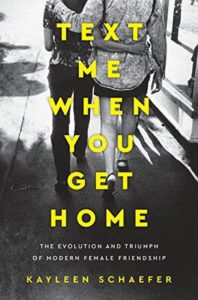I received a free e-version of Text Me When You Get Home from Dutton Books via NetGalley. I’m grateful to Dutton and NetGalley for their generosity in providing a copy for me to review. All opinions are my own.
 “Text me when you get home” is not an aggressive rallying-cry like the anti-Donald Trump, pro-woman “This pussy grabs back,” but it does mark a sea change. It’s a way women are saying, through our care for each other, that our friendships are not what society says they are. We’re reclaiming them. We’re taking them back from the shitty words they’ve been smothered by for way too long:
“Text me when you get home” is not an aggressive rallying-cry like the anti-Donald Trump, pro-woman “This pussy grabs back,” but it does mark a sea change. It’s a way women are saying, through our care for each other, that our friendships are not what society says they are. We’re reclaiming them. We’re taking them back from the shitty words they’ve been smothered by for way too long:
Women can’t get along.
They’re probably lesbians.
Women who say they like each other are lying. What a bunch of catty bitches.
Women ditch their friends when they meet a guy.
What we’re doing by holding each other close in whatever ways we can is lifting our friendships out of these stereotypes. We’re not going to let the kinds of relationships we want to have be undermined any longer.
 When I look back on my early life, I am not one of those women who can identify a string of close girlfriends. I fully admit that I was not the easiest child to be friends with—my social skills weren’t great, I was intensely competitive over intellectual things, and—quite frankly—holier-than-thou. For most of the first three decades of my life, religion provided a set of rules to follow. I was not a rule-breaker. Rule-breakers are bad.
When I look back on my early life, I am not one of those women who can identify a string of close girlfriends. I fully admit that I was not the easiest child to be friends with—my social skills weren’t great, I was intensely competitive over intellectual things, and—quite frankly—holier-than-thou. For most of the first three decades of my life, religion provided a set of rules to follow. I was not a rule-breaker. Rule-breakers are bad.
What would have been a natural friend group among my peers at church constantly felt like an exclusive clique. I had no problem finding someone to sit with or hang out with during youth group events. But I would quickly come to discover during these events that I typically wasn’t invited when one of the girls wanted hang out one-on-one with someone or even in a smaller group. I was a second-tier friend, never best-friend quality. But for my proximity and attendance at the various church youth group events, even this semblance of having female friends likely would have nearly disappeared.
In high school, I did have friends I considered at the time to be close friends. Looking back, I can see that much of what prevented these friendships from being deeper was my own issues, including their legitimate fear of my judgment if they confided in me what they were doing or feeling. (Sex! The horror.) I didn’t realize at the time that these friendships were essentially one-sided. With my confiding in them but their being unable to return the trust. The result of this kind of relationship was the severing of these friendships once we went to college. I’m not sure I spoke to any of the girls I thought were my friends again after that, outside of running into them somewhere. Indeed, when I visited my parents in the years after high school, the only friend I ever made a point to see while I was home was male, my friend since first grade.
College was an improvement, with deep friendships at the time with two women in particular. And yet here too, “friends forever” didn’t last. I probably haven’t talked to these two women in almost ten years. While I have stayed in contact with two other women, the friend I have stayed closest with since college is, again, male. He is the person I always make a point to see when I visit my family.
It is only as a thirty-something woman that I developed the kind of female friendships Schaefer celebrates in Text Me When You Get Home: The Evolution and Triumph of Modern Female Friendship. I have my ride-or-die, show-up-at-my-house-at-midnight-if-I-call women now. We have a group text that is active at least once a day. They quite literally saved me when I was leaving my abusive ex-husband several years ago.
But Tell Me About the Book
While Text Me is, as the title indicates, a study of modern female friendship, it is equally a memoir. Schaefer grounds her exploration into the evolution of what female friendship means within her own experience. My experience detailed above (minus the oppressive influence of religion) is similar to Schaefer’s experience detailed in the book. Like Schaefer, I saw other women as my rivals. There was a scarcity of attention—adult approval, male gaze, teachers’ accolades—and girls were my competition. As an adult I can see that this is entirely untrue but it has taken decades to learn.
Schaefer dissects her time spent in high school, college, and shortly after having her priorities, time, and even relationships centered around men. This resonated with me as well. Having felt like I was being left out of deep female friendships that other women around me seemed to have, it was easy to fall into thinking that I was just better friends with guys. In many ways it was a comfort to me to see that Schaefer experienced this too—that in her job as a journalist and in her early adult years she also fell in this trap. One of the dangers here, as Schaefer identifies, is that as you center your life around male approval, you grow farther and farther from other women. This doesn’t even require that you have close male friendships instead—merely feeling like you have to be the kind of woman that your male acquaintances and coworkers approve of often means you have to seem to not be “girly” or like other women. This desire for male approval turns into pushing other women away. It was on the one hand heartening to see my experiences set out so clearly by another woman and sad to look back and see how so much of my struggle and feeling alone didn’t have to be this way. I made choices and this is my bed to lie in, yes, but these were also many of the choices society was pushing me to make at that time.
This book is, however, also about the evolution of friendships. After lamenting her male-centric experiences in the first few decades of her life (and providing the context and referencing studies that explain why she felt this way), Schaefer discusses the recent phenomenon of women delaying marriage and the role female friendships are playing for these women.
Lighter Nonfiction
As far as literary value goes, I found Text Me interesting and engaging, but much of the material stays fairly surface-level. (This isn’t necessarily a problem—many people don’t want to read an academic work and I mention this more so that you know what you’re getting if you pick this one up). For example, Schaefer discusses the myth of the mean girl and its uses to divide girls but stops here. She doesn’t take the analysis much farther, though this would be an opportunity to explore how society’s insistence on dividing women from each other is a tool of patriarchal power structures whose existence is ensured when women are separated from each other. Given how Schaefer structured her book, however, this level of critique would feel like a tangent. While she cites a variety of sources from interview quotes of starlets to published academic papers, the studies cited are centered around Schaefer’s personal revelations which makes the book both more personal but also, by necessity, less academic. There are endnotes so for readers who want to explore a topic more fully, that is an option.
Text Me is also absolutely peppered with pop culture references—while Schaefer details her experience as well as those of other women she personally talks to, the almost the entirety of the rest of her examples derive from pop culture. She cites Leslie Knope’s love of Ann Perkins as well as the women of HBO’s Big Little Lies. In discussing the history and evolution of friendships, she cites older television shows as well, yet even these I had mostly heard of. While this was effective for me as a thirty-something reader in 2018, it does make me question the longevity of this book.
Intersectional Experiences
It should also be said the Schaefer is white and this is her memoir. She makes an obvious effort to discuss pop culture featuring minority characters including Girlfriends, Living Single, Insecure, and The Joy Luck Club and even has a short section pointing out the lack of representation of friendships of women of color in pop culture. She devotes several pages to the friendship between Oprah Winfrey and Gayle King. And yet, the limitations of Schaefer and her friend circle as well as the under-representation of women of color on major television networks and in movies means the vast majority of Schaefer’s discussion and examples are centered around white women. In the next week I actually have a post planned to discuss Meg Wolitzer’s most recent book The Female Persuasion and its limitations of being centered in White Feminism, particularly as contrasted against Gloria Steinem’s autobiography. Which is say, that as a reader I try to consider things like the whether authors acknowledge the varied experiences of women of color and consider how the intersection of things like race and class make the burdens of being a modern woman that much heavier.
I don’t feel like Schaefer does present women of color often, and yet I perceived in her writing that Schaefer knew this was a limitation of her work and acknowledged where she could that women of color have different experiences and yet are less widely represented and considered. I think Text Me is a book that will appeal mostly to white audiences because it may be harder for a woman of color to see herself in Schaefer’s repeatedly white examples, and yet this isn’t a function of Schaffer’s blindness or willful indifference to this limitation.
Conclusion
I really enjoyed Text Me When You Get Home and blew through it in a few days. It was easy to read, particularly for a nonfiction book. I felt like Schaefer presents a story that will seem familiar to many women my age and the book is more effective for this connection. Schaefer made significant points about the way we socialize girls to dislike other girls and how women perpetuate their estrangement from other women by seeking male approval (difficult to fight given that positions of authority are often occupied by men), yet these points are largely made through her personal recollections or television examples. It was an interesting technique that could have gone off the rails but worked. I found the pop culture references to be mostly well-used though I also see how these may turn away some readers who would prefer to see more academic studies and less HBO.
Text Me made me really look back and see how my relationships with girls and women evolved in my own life over the last three decades. Looking back at the way I treated women who I wanted to be friends with, I’m left thankful for the women I have now—Ritz, Shelby, Brittany, Sarah, Elora, Rachel. For Paige, Erica, Kelly, Sara, and Carly—I’m sorry for the countless times I wasn’t a good friend to you when we were younger. I hope that in the years since Mount Pleasant, CHHS, and William & Mary that you found your ride-or-die women. Text me when you get home?
Notes
Published: February 6, 2018 by Dutton Books (@duttonbooks)
Author: Kayleen Schaefer (@iknowkayleen)
Date read: May 6, 2018
Rating: 3 ¾ stars
Featured Image and Photo credit: rawpixel

